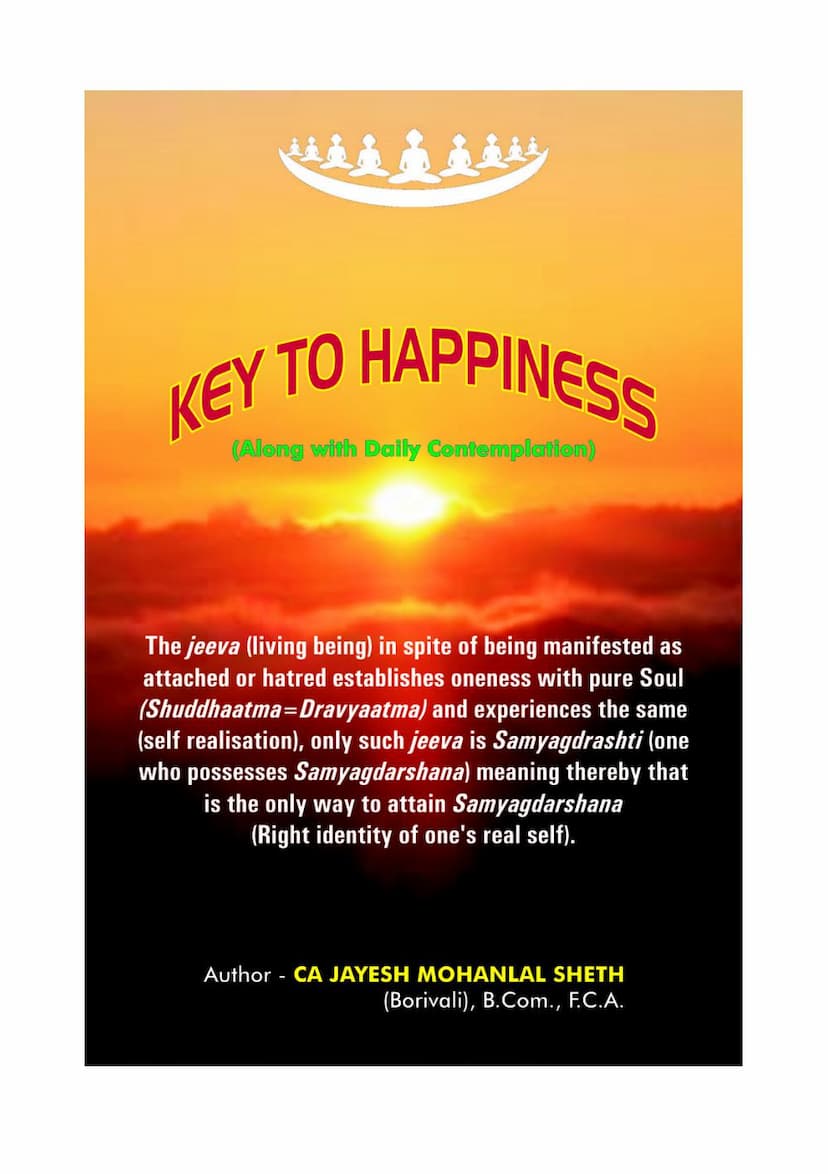Key To Happiness
Added to library: September 2, 2025

Summary
Here's a comprehensive summary of the Jain text "Key to Happiness" by Jayesh Mohanlal Sheth, based on the provided pages:
Core Message:
The central thesis of "Key to Happiness" is that true, lasting happiness is not found in worldly possessions, sensual pleasures, or external circumstances, but in achieving Samyagdarshana, which is the right identification of one's true self. This involves realizing one's soul (Shuddhaatma) as distinct from the body and karmic manifestations, and establishing oneness with this pure soul. This realization is the "key" that unlocks the path to liberation (Moksha) and eternal bliss.
Key Concepts and Teachings:
- The Nature of Happiness: The book distinguishes between temporary, physical-sensual happiness (which is an illusion and often leads to more suffering) and permanent, spiritual happiness, which is the ultimate goal.
- The Importance of Samyagdarshana: This is presented as the absolute prerequisite for spiritual progress and the end of the cycle of transmigration (Samsara). It's described as a rare and invaluable attainment that should be the primary focus of human life.
- The True Self (Soul): The book emphasizes that the soul (Jeeva, Shuddhaatma, Dravyaatma) is the eternal, pure, and conscious essence of a being, distinct from the physical body and karmic encumbrances. Recognizing and experiencing this true self is the core of Samyagdarshana.
- The Cycle of Transmigration (Samsara): The text highlights that without Samyagdarshana, beings are trapped in a perpetual cycle of birth, death, and suffering, moving through various states of existence (gatis) like an oil-mill bullock.
- Karma and its Effects: The book explains that every action (karma) has consequences. Sinful deeds (paapa) lead to suffering, while meritorious deeds (punya) lead to temporary happiness. However, true liberation comes from transcending the effects of both. The concept of karma explains why one experiences happiness or suffering.
- Attaining Samyagdarshana: The book provides practical guidance on how to achieve Samyagdarshana:
- Discrimination (Bhedgnyaana): Differentiating the soul from the body and karmic matter.
- Intellectual Contemplation: Focusing the mind on the pure soul (Shuddhaatma) by intellectually ignoring or setting aside impurities and worldly thoughts.
- Oneness with Shuddhaatma: Establishing a deep connection and experiencing the pure soul.
- Right Faith, Right Knowledge, Right Conduct: These are the foundational elements of the path to liberation.
- Daily Practices:
- Morning and Evening Rituals: The book recommends chanting the Namaskara Mahamantra, performing "Bhaava Pratikramana" (mental purification and repentance), and resolving to abstain from sins.
- Twelve Bhaavnas (Contemplations): These are twelve meditations on fundamental truths like impermanence, the solitariness of the soul, the filthiness of the body, the influx and stoppage of karma, etc., designed to cultivate detachment and right understanding.
- Contemplation on Death (Samadhi Marana): Preparing for a peaceful and conscious departure from the body by being detached from worldly concerns and focused on the soul.
- Ethical Guidelines:
- Non-vegetarianism: Strongly discouraged due to the sin involved in taking the life of sentient beings.
- Avoiding Kandmoola (Roots and Bulbs): Advised against due to the presence of infinite microscopic beings within them, leading to immense karmic bondage.
- Avoiding Dinner after Sunset (Ratribhojana): Recommended for spiritual and health reasons, as it aids in bodily detoxification and proper sleep.
- Mind and Meditation: The mind is identified as the crucial instrument for both karmic bondage and liberation. Meditation (Dhyana) is categorized into auspicious (Dharma-dhyana) and pure (Shukla-dhyana), with the latter leading to liberation. It warns against meditations that strengthen the identification with the body.
- The Role of the Guru and Scriptures: Studying scriptures and following the teachings of enlightened beings (Gurus) are essential for gaining knowledge and guidance.
- Transformation of Perspective: The book stresses the importance of changing one's perspective from worldly attachments to spiritual aspirations. It encourages acceptance of truth and the willingness to alter wrong beliefs.
Author's Intent:
CA Jayesh Mohanlal Sheth, a Chartered Accountant, states his intention to bring about a "revolution in the spiritual world." He aims to provide a practical, experienced, and universal truth-based path to self-realization for the welfare of humankind. He emphasizes simplicity and clarity in his writing, making profound spiritual concepts accessible to a wider audience.
In essence, "Key to Happiness" is a guide to achieving ultimate happiness by shedding worldly attachments, understanding the true nature of the self, and diligently following the path of Jainism towards spiritual liberation.